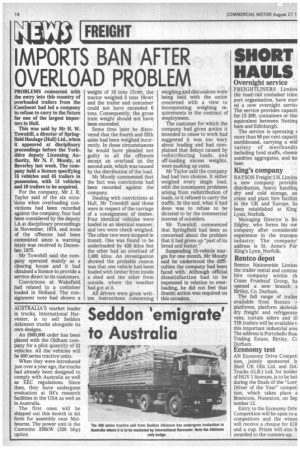IMPORTS BAN AFTER OVERLOAD PROBLEM
Page 16

If you've noticed an error in this article please click here to report it so we can fix it.
PROBLEMS connected with the entry into this country of ,overloaded trailers from the Continent had led a company to refuse to carry in the future for one of the largest importers in Hull.
This was said by Mr H. W. Townhill, a director of Springfield Haulage (Hull) Ltd., when it appeared at disciplinary proceedings before the Yorkshire deputy Licensing Authority, Mr N. F. Moody, at Beverley last week. The company held a licence specifying 15 vehicles and 45 trailers in possession, with 15 vehicles and 10 trailers to be acquired.
For the company, Mr J. R. Taylor said of the six occa'sions when overloading convictions had been recorded against the company, four had been considered by the deputy LA at disciplinary proceedings in November, 1974, and none of the offences had been committed since a warning letter was received in Decem ber, 1975. • Mr Townhill said the company operated mainly as a clearing house and it had obtained a licence to provide a service direct to its customers.
Convictions at Wakefield • had related to a container loaded in Holland. The consignment note had shown a weight of 19 tons 17cwt, the tractor weighed 5 tons 18cwt and the trailer and container could not have exceeded 6 tons. Consequently, the gross train weight should not have been exceeded.
Some time later he discovered that the fourth and fifth axles had been weighed incorrectly. In these circumstances he would have pleaded not guilty to all the offences except an overload on the second axle, which was caused by the distribution of the load.
Mr Moody commented that the fact was convictions had been recorded against the company. Dealing with convictions at Hull, Mr Townhill said these were in respect of the carriage of a consignment of timber. Four identical vehicles were loaded in an identical manner, and two were check weighed. The other two were stopped in transit. One was found to be underloaded by 420 kilos but the other had an overload of .1,400 kilos. An investigation showed the probable reason was that one vehicle had been loaded with timber from inside a shed and the other from outside, where the weather had got at it.
All drivers were given written instructions concerning weighing and discussions were being held with the union concerned with a view to incorporating weighing requirements in the contract of employment.
The customer for which the company had given notice it intended to cease to work had suggested it was too wary about loading and had complained that delays caused by redistributing loads, and off-loading excess weights, were pushing up costs.
Mr Taylor said the company had had two choices. It either weighed every single load, with the consequent problems arising from redistribution of loads, or it refused to carry the traffic. In the end, what it had done was to refuse to be dictated to by the commercial interest of outsiders.
Mr Townhill commented that Springfield had been so concerned about the problem that it had given up "part of its bread and butter."
Suspending 15-vehicle margin for one month, Mr Moody said he understood the difficulties the company had been faced with. Although official dissatisfaction had to be expressed in relation to overloading, he did not feel that drastic action was required on this occasion.




















































































